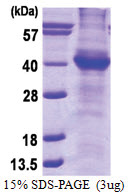Amyloid beta A4 protein / APP (18-289, His-tag) Human Protein
CAT#: AR50323PU-S
Amyloid beta A4 protein / APP (18-289, His-tag) human recombinant protein, 0.1 mg
Size: 500 ug
Other products for "APP"
Specifications
| Product Data | |
| Species | Human |
| Expression Host | E. coli |
| Expression cDNA Clone or AA Sequence |
MRGSHHHHHH GMASMTGGQQ MGRDLYDDDD KDRWGSLEVP TDGNAGLLAE PQIAMFCGRL NMHMNVQNGK WDSDPSGTKT CIDTKEGILQ YCQEVYPELQ ITNVVEANQP VTIQNWCKRG RKQCKTHPHF VIPYRCLVGE FVSDALLVPD KCKFLHQERM DVCETHLHWH TVAKETCSEK STNLHDYGML LPCGIDKFRG VEFVCCPLAE ESDNVDSADA EEDDSDVWWG GADTDYADGS EDKVVEVAEE EEVAEVEEEE ADDDEDDEDG DEVEEEAEEP YEEATERTTS IATTTTTTTE SVEEVVRE
|
| Tag | His-tag |
| Predicted MW | 34.7 kDa |
| Concentration | lot specific |
| Purity | >85% by SDS - PAGE |
| Presentation | Purified |
| Buffer | Presentation State: Purified State: Liquid purified protein Buffer System: 20 mM Tris-HCl buffer (pH 8.0) containing 20% Glycerol, 0.1M NaCl, 1 mM DTT |
| Preparation | Liquid purified protein |
| Protein Description | Recombinant human APP protein, fused to His-tag at N-terminus, was expressed in E.coli and purified by using conventional chromatography. |
| Storage | Store undiluted at 2-8°C for one week or (in aliquots) at -20°C to -80°C for longer. Avoid repeated freezing and thawing. |
| Stability | Shelf life: one year from despatch. |
| Reference Data | |
| RefSeq | NP_000475 |
| Locus ID | 351 |
| UniProt ID | P05067, A0A140VJC8 |
| Cytogenetics | 21q21.3 |
| Synonyms | AAA; ABETA; ABPP; AD1; alpha-sAPP; APPI; CTFgamma; CVAP; PN-II; PN2; preA4 |
| Summary | This gene encodes a cell surface receptor and transmembrane precursor protein that is cleaved by secretases to form a number of peptides. Some of these peptides are secreted and can bind to the acetyltransferase complex APBB1/TIP60 to promote transcriptional activation, while others form the protein basis of the amyloid plaques found in the brains of patients with Alzheimer disease. In addition, two of the peptides are antimicrobial peptides, having been shown to have bacteriocidal and antifungal activities. Mutations in this gene have been implicated in autosomal dominant Alzheimer disease and cerebroarterial amyloidosis (cerebral amyloid angiopathy). Multiple transcript variants encoding several different isoforms have been found for this gene. [provided by RefSeq, Aug 2014] |
| Protein Families | Druggable Genome, Transmembrane |
| Protein Pathways | Alzheimer's disease |
Documents
| FAQs |
| SDS |
Resources
Recombinant Protein Resources |
{0} Product Review(s)
0 Product Review(s)
Submit review
Be the first one to submit a review
Product Citations
*Delivery time may vary from web posted schedule. Occasional delays may occur due to unforeseen
complexities in the preparation of your product. International customers may expect an additional 1-2 weeks
in shipping.






























































































































































































































































 Germany
Germany
 Japan
Japan
 United Kingdom
United Kingdom
 China
China
